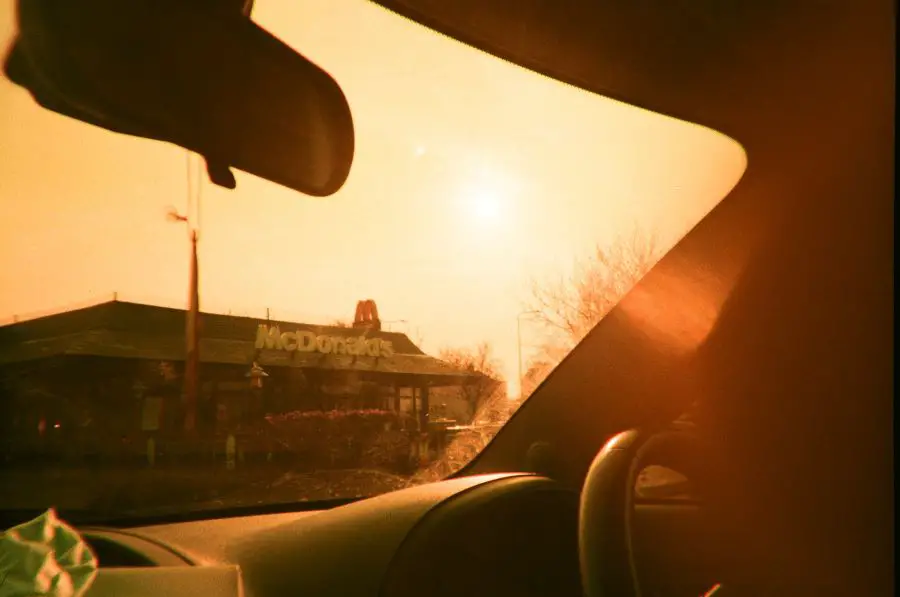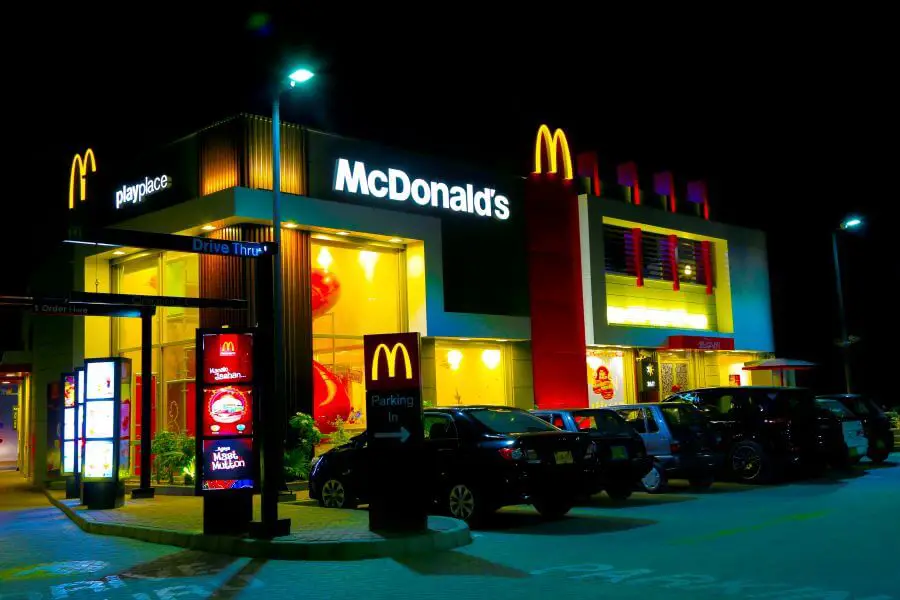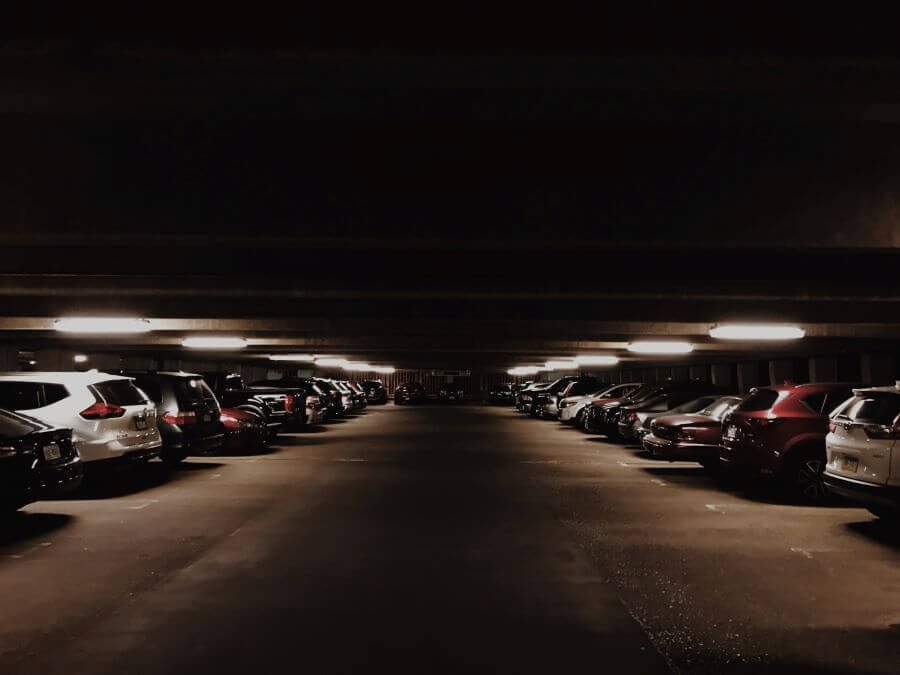Parking your car overnight at a McDonald’s restaurant is convenient, especially if you’re on a road trip or looking for a safe resting spot.

However, it’s essential to understand the policies and potential risks associated with leaving your vehicle at a McDonald’s parking lot overnight.
Today, we’ll explore various aspects of overnight parking at McDonald’s, including their policies, safety measures, legal considerations, and alternatives for extended parking.
McDonald’s Parking Policy
Each McDonald’s location may have varying policies regarding overnight parking. While some restaurants allow it, others strictly prohibit vehicles from staying overnight.
The procedure can depend on factors such as the location type, urban or rural settings, and specific regulations imposed by the local authorities.
It’s crucial to note that McDonald’s is private property, and their parking spaces are primarily intended for customers visiting the restaurant during operating hours.
Varying Policies by Location
The overnight parking policy at McDonald’s can differ from one location to another. Some restaurants may have designated areas for overnight parking, while others outright prohibit it.
It’s essential to research and inquire about the specific policies of the McDonald’s you plan to visit. This information can be obtained by contacting the restaurant directly or checking their website for any parking guidelines they have in place.
Overnight Parking Rules
When considering overnight parking at a McDonald’s, it’s essential to familiarize yourself with the rules and regulations.
Some locations may have time restrictions, allowing only a specific number of hours for parking, while others may require you to register your vehicle with the management.
It’s essential to comply with these rules to avoid potential consequences, such as your vehicle being towed or fined.
Understanding the Risks
Before deciding to leave your car overnight at a McDonald’s parking lot, it’s essential to consider the potential risks involved.
Safety and security concerns should be priorities, as parking lots can attract unwanted attention or criminal activity during late hours.
While McDonald’s tries to provide a safe environment for their customers, it’s essential to acknowledge that it cannot guarantee complete security for vehicles parked overnight.
Therefore, taking necessary precautions and evaluating the specific location’s safety measures is crucial.
Safety and Security Concerns
Safety should be your utmost concern when parking your vehicle overnight at any location. Although McDonald’s parking lots are typically well-lit and monitored, theft, vandalism, or other criminal activities are always risky.
It’s advisable to lock your vehicle and remove any valuable belongings or items that may attract attention. Some individuals invest in additional security measures, such as steering wheel locks or alarms, to protect their vehicles.
Possibility of Towing or Fine
Leaving your vehicle overnight at a McDonald’s parking lot without adhering to their policies can result in your car being towed or fined. If a location explicitly prohibits overnight parking, they will likely take action to ensure compliance.
Towing companies contracted by the restaurant may patrol the parking lot to identify vehicles violating the rules. In such cases, you may be required to pay towing fees and fines to retrieve your vehicle.
Factors Influencing Overnight Parking
Several factors influence the decision to allow or disallow overnight parking at McDonald’s locations. Standalone restaurants not situated within a larger shopping mall or shared parking spaces may have different policies compared to those that do.
This distinction is often due to liability concerns and the need to manage the parking capacity.
Additionally, urban settings with limited parking availability might have stricter regulations regarding overnight parking, while rural areas, with more abundant space, might be more lenient.
Location Type: Standalone vs. Mall Outlets
Standalone McDonald’s restaurants often have more control over their parking facilities, making implementing and enforcing overnight parking policies easier.
These locations may have larger parking lots, specifically designated spots, or even security personnel to ensure the safety of parked vehicles.
On the other hand, McDonald’s outlets within shopping malls or shared parking spaces might have limited influence over the parking rules, as a larger entity typically governs them.
Urban vs. Rural Settings
The location’s urban or rural setting can significantly impact the overnight parking policy. In urban areas where parking is scarce, there may be stricter regulations to prevent unauthorized use of parking spaces or to prioritize customer turnover.

In contrast, rural areas with more abundant parking options may have more relaxed policies, allowing more extended parking periods without strict enforcement.
Communicating with McDonald’s Staff
If you’re considering leaving your car overnight at a McDonald’s parking lot, it’s advisable to communicate with the restaurant’s staff beforehand. Inquiring about their overnight parking policy will give you a clear understanding of whether it’s allowed and any specific guidelines you need to follow.
When approaching the staff, it’s important to maintain respectful communication and abide by their instructions. Remember that they -making authority.
When speaking with McDonald’s staff regarding overnight parking, it’s important to remember that they have the final say in enforcing their policies.
If they inform you that overnight parking is not allowed or have specific requirements that need to be met, it’s essential to respect their decision.
Trying to argue or negotiate may not yield a favorable outcome and could strain your relationship with the staff and management.
Legal Considerations
In addition to McDonald’s policies, it’s also crucial to consider the legal implications of leaving your car overnight on private property.
Laws regarding parking regulations can vary from one jurisdiction to another. Some cities or states may have specific rules or ordinances that regulate overnight parking in private lots.
It’s advisable to familiarize yourself with the relevant laws in the area where McDonald’s is located to ensure compliance.
Alternatives to Overnight Parking at McDonald’s
If overnight parking at a McDonald’s is not feasible or permitted, alternative options exist. Here are a few alternatives to explore:
Hotels: Many hotels offer overnight parking for guests, even if you are not staying there. Contact nearby hotels to inquire about their policies and rates for overnight parking.
- Rest Areas: Rest areas along highways often provide designated parking spaces for vehicles to rest overnight. These areas are typically monitored and offer basic amenities such as restrooms and vending machines.
- Campgrounds: If you’re traveling with camping equipment, staying at a campground can be affordable and convenient. Campgrounds usually provide secure parking facilities and amenities such as showers and cooking areas.
- Truck Stops: Truck stops often have designated areas for overnight parking for trucks and regular vehicles. These locations are well-monitored and may offer amenities like showers, fuel, and dining options.
- Public Parking Lots: Local municipalities or parking authorities may operate public parking lots that allow overnight parking for a fee. These lots are usually well-lit and monitored for security.

- Friend or Family: If you have friends or family members living in the area, consider contacting them and asking if you can park your vehicle overnight at their residence.
Planning and researching these alternative options before your trip is important to ensure a safe and legal parking solution.
Conclusion
While some McDonald’s locations may allow overnight parking, it’s crucial to understand and adhere to their policies and guidelines. Communication with the staff and respectful compliance with their instructions is key.
However, it’s also essential to consider the safety and security risks of leaving your vehicle overnight in a public space.
Understanding alternative options such as hotels, rest areas, campgrounds, truck stops, public parking lots, or seeking assistance from friends and family can provide viable alternatives for extended parking needs.
Remember to prioritize your safety and the legal requirements of the area you’re visiting when deciding on overnight parking.





